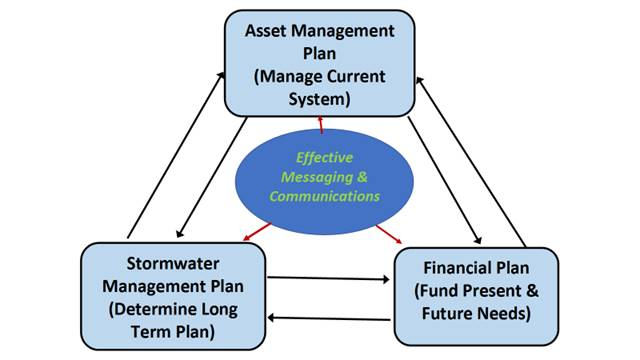Municipal stormwater departments and utilities face difficult challenges in building and maintaining effective programs. The ideas and advice in the guide are not intended to be a substitute for or interpretation of NPDES permit requirements, but rather a set of tools to assist in meeting permit requirements and other municipal goals.
As we issue this initial guide, we hope that with your help we can improve it over time. Based on your feedback, we plan to make improvements to existing chapters and possibly introduce new ones depending upon the topics and issues the community of stormwater managers identify as most in need of support. We look forward to hearing your feedback, and we hope this proves to be useful in your efforts to build and maintain excellence in stormwater management.
Keys To Long-Term Success
In working with stormwater managers across the United States from very small to very large communities, we’ve observed the importance of several key program capabilities that seem to be critical to long-term success:
- Stormwater management requires special skills. All stormwater programs need at least a basic level of technical, managerial, and financial capabilities to address the unique demands of stormwater management.
- All communities need to make the “business case” for robust stormwater management, addressing benefits and avoided costs of better stormwater management, to the public and key decision-makers in order to obtain necessary program support and resources.
- Long-term program planning is critical to setting goals, identifying needed future actions and investments, and determining whether an independent stormwater utility is needed.
- Long-term financial planning is critical, taking into account funding needs, revenue sources, affordability considerations, and their connection to long term program commitments.
- Investment in some level of active asset management planning to enable tracking and maintenance of current assets (and inclusion of new assets) greatly improves a community’s ability to properly track, operate, and maintain existing program infrastructure and resources.
- Some level of coordination with neighboring jurisdictions in program planning, funding, operations, and monitoring/assessment work is vital due to the interconnectedness of waters and water management challenges in many watersheds.
- Leveraging stormwater program work with associated local programs (e.g., economic redevelopment and revitalization, transportation system management, flood control, parks and open space management) can enable local stormwater agencies to provide better service and pursue broader goals than they could if they were solely limited by their own program resources.
- Best practices in program operations (e.g., procurement processes, technical operational issues, monitoring and effectiveness assessment) can help improve the efficiency and effectiveness of your efforts.
Organization of the Guide
The guide is organized into more than a dozen topics within six focal areas:
- Municipal Separate Storm Sewer System (MS4) 101
- Communication and Outreach
- Funding
- Operations
- Program Goals and Management
- Water Quality Outcomes
All these different program elements reinforce each other, as illustrated in the graphic to the right. Each topic page includes links to additional resources with more information.

Figure showing site relationships including the topics and resources connected to those topics.

